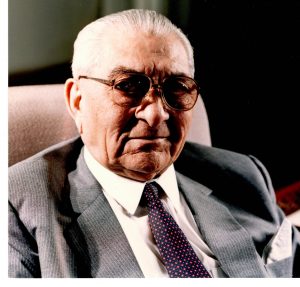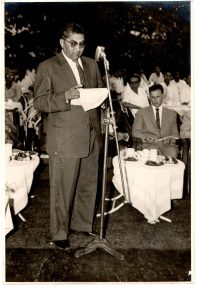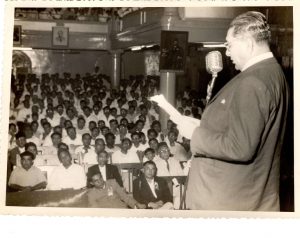Life of Ahmed Dawood
Ahmed Dawood, one of the pioneering industrialists of Pakistan, was born in Bantva, a small town in Kathiawar, British India, in 1905. His father, Dawood Yaqoob, was a trader and a prominent person of the Bantva family. The family originally belonged to Gandhi cast, but when they migrated to Pakistan, they were known as ‘Dawoods.’ His grandfather’s name was Yaqoob Gandhi and great Grandfather’s name was Abu Gandhi.
Ahmed Dawood childhood was very different from other children. Since very few people used to go to schools back then, Ahmed Dawood was also not inclined towards studying and only received education till grade III. He, along with his brothers studied in a government school of Bantva where monthly fees was just 1 ana. His ancestors/forefathers were traders for a very long time, and ultimately, Ahmed Dawood also got involved in trading.
Ahmed Dawood and his siblings were brought up in a religious atmosphere. His mother, Hanifa Bai, was the leading lady of the house, and granted complete autonomy to her children. Since childhood, Ahmed Dawood had an ambitious nature. He loved to work and was sent to stay with his maternal grandfather, Abdul Ghani Haji Noor Muhammad, so that he could learn some work. At that time, his was only 12 years old.
Abdul Ghani used to trade cotton yarn, wheat and grains in a small area of district Mysore. Ahmed Dawood worked in his nana’s shop for a brief period of 1 or 2 years from where he got the basic training of trade. Upon seeing his passion, Abdul Ghani sent Ahmed Dawood to his business partner Hashim Haji Ghani in Shimoga (Maysore). Here, Ahmed Dawood worked for 1 or 2 years in his shop tirelessly. After some time, with the consent of Abdul Ghani, Ahmed Dawood was transferred from Shimoga to Kenawali (Madras) to another branch with more responsibilities.
After the death of his father, Ahmed Dawood migrated to Bombay and started his own business at the age of 15. Under the supervision of his grandfather, Ahmed Dawood opened a shop in Hanuman Building situated in Tambakata. He named it after his youngest brother Suleman and himself – MESSRS. Suleman Ahmed.
The family made the transition from business to industry, first establishing Dawood Cotton Mills Limited in 1952. The industry expanded rapidly. In 1959, the family purchased Burewala Textile Mills, a cotton textile mill with its own ginning factory, and in 1969 established Dillon, which manufactured nylon and synthetic yam. Their last textile venture was Lawrencepur Woolen Mills. In East Pakistan, Ahmed Dawood ran Karnaphuli Paper and Chemical Mill profitably till the emergence of Bangladesh. Karnaphuli Paper and Chemical Mill was the first mill in the world to make paper from bamboo. Karnaphuli Jute Mills Ltd was also established in East Pakistan which was managed by the Dawood family. The strategy of diversification was marked by the setting up of Dawood Hercules Chemicals (Urea fertilizer), followed by Transpak (baby food, toothpaste, toothbrushes and other consumer goods), Dawood Yamaha (Motorcycles), Dawlance (refrigerators and microwaves), Descon Engineering (construction), and Meiji Biscuits.
Ahmed Dawood was also the founder trustee of Al-Shifa Eye Hospital to which his Foundation has contributed more than Rs. 15 million. He also founded The Dawood Foundation in 1961 through which he established Dawood Engineering College in Karachi. In the early days, some of the subjects taught in this College were not being taught in any other university/college anywhere in Pakistan. Even after nationalization of this College, he provided casual financial aid to the institution. It is still a leading institution of technical education. The Foundation runs schools and other charitable institutions.
He was one of the key members to bring Memon community together and help the community. The community also formed Memon Bank in Kharadar area of Karachi. As a philanthropist, Seth Ahmed Dawood has made immense contributions in education and welfare services. He left Pakistan for a couple of years during which period he did exploratory work in the USA in the field of oil exploration. However, he returned home in 1977.
He led a long eventful life and saw many ups and downs in his business. He died in January 2002 at the age of 97.




